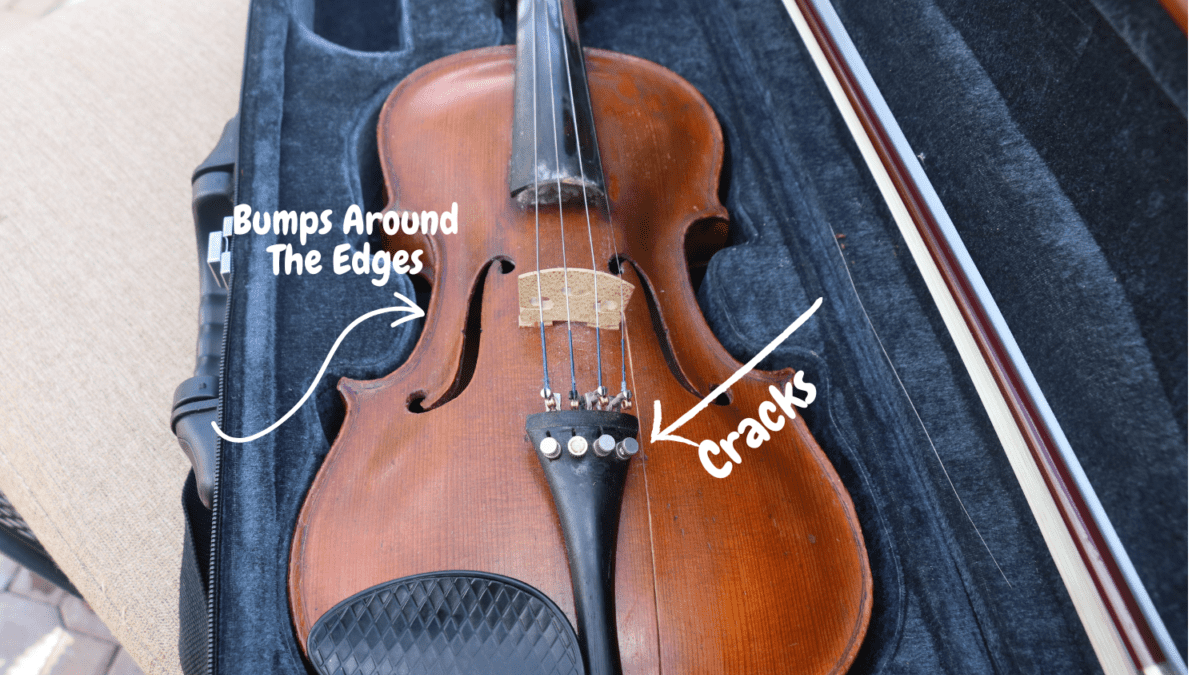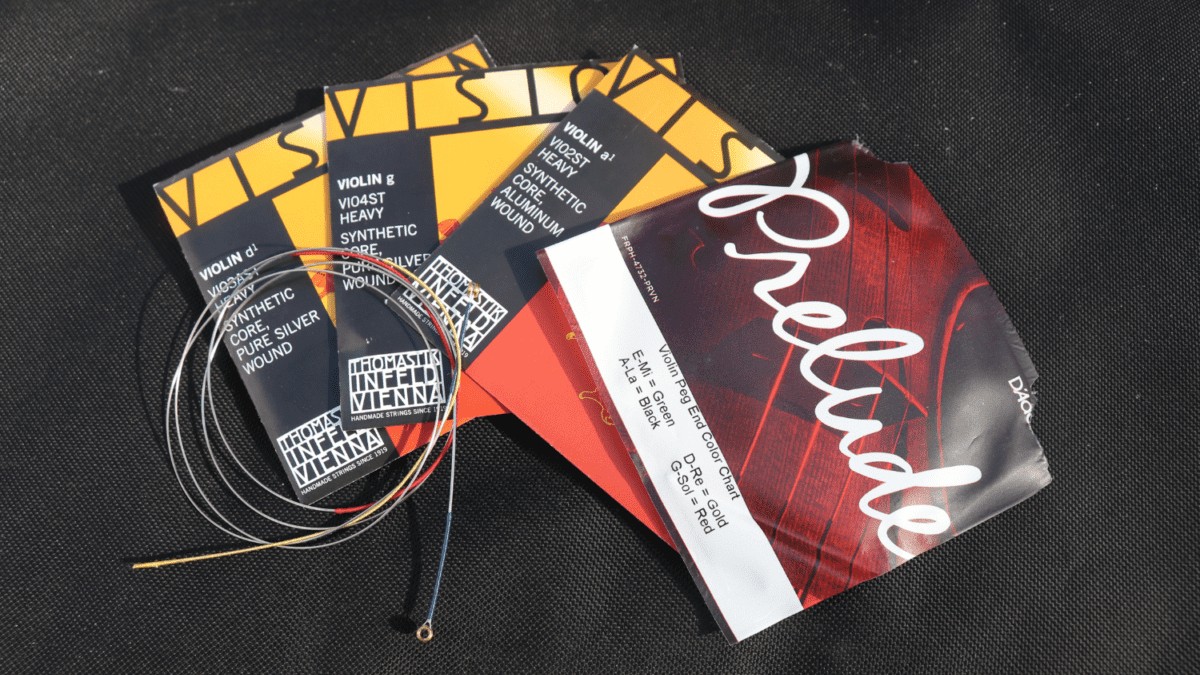
There are many reasons why your violin may sound out of tune. As you know, the violin is a very complex instrument that needs your constant attention, so it’s a good idea to take good care of it so it can sound as best as possible.
The primary reason why violins go out of tune is due to a sudden change in temperature and humidity. For this reason, keeping your violin at room temperature is essential to ensure that it isn’t constantly going out of tune.
However, there are also various reasons why your violin may go out of tune. Even some that you might be unaware of! Don’t stress it too much, though. This is a prevalent issue for many violinists!
1. New Strings Need Time To Break In
You might’ve noticed that new strings quickly go out of tune when you put them in. This is because new strings often take time to break in because they need time to stretch. Don’t worry, though. This process doesn’t last long.
On average, it takes about a day or two so the string can be fully broken in. In some cases, even less, especially if you play often. However, this usually isn’t the case with strings with a synthetic core.
Strings with a synthetic core usually take much longer than your average string. Synthetic core strings typically take about a week or two to break in.
If you have an important performance, I recommend replacing your string at least a day or two before you perform so your violin isn’t going out of tune while you’re playing. Trust me, I’ve replaced my strings while working, and it isn’t fun having to constantly tune your violin every 5 minutes, especially in front of a crowd!
2. You Dropped Or Bumped Your Violin Onto Something
Many violinists don’t know that dropping or bumping your violin onto something can affect the way the violin sounds.
I once had a violin that had an excellent and powerful sound. The sound it produced was like no other, to be honest. It was really loud compared to most of the violins I’ve ever used.
Unfortunately, I damaged my beautiful instrument by accidentally dropping it and creating a crack on the soundboard (the top of the violin). As a result, my violin lost its potency.
When you drop or bump your violin onto something, you can move or change the position of the sound post (The sound post plays a vital role when it comes to the violin producing a good-quality sound).

The sound post is responsible for carrying the sound onto the soundboard and also, onto the back of the violin. The sound post helps the violin create a sound that resonates.
When I dropped my violin, I messed up the position of the sound post, which is why it lost its potency. It was also challenging to play on tune most of the time. Many of the sounds I would create were scratchy and did not resonate very well. I was devastated, but that experience served me a lesson.

ALWAYS make sure to take good care of your violin. Avoid bumping your violin onto things and treat it like a delicate object.. because it is!
The soundpost can be very delicate, and you want to avoid moving it to create a good sound.
3. Change In Temperature
A sudden change in temperature might be another reason your violin sounds out of tune. This is because the weather can cause the wood fibers on the violin to expand or contract, depending on the weather.
Cold weathers typically cause the violin to contract, which can also affect the way the violin sounds.
The changes in the violin are subtle but can have the most significant impact. That’s why it’s essential to keep your violin at around room temperature and avoid rapidly changing its temperature.
A sudden temperature change can also affect the sound post, and as I mentioned, the sound post plays an integral part in creating a good sound on the violin.
Luckily, there are ways that you can manage the humidity levels of the violin. For example, some violinists use a product called “Damp-It” to help regulate the humidity levels on the violin.
Damp-It is a long sponge you soak in water and place inside your violin. The water from the sponge helps regulate the humidity levels on your violin to about 40%-50%, which is the optimal level.
4. Not Playing On Tune
Another common reason your violin may sound out of tune is that you’re simply not playing on tune, as harsh as it sounds.
The violin is one of the most challenging instruments to learn. There are so many techniques that one has to learn and plenty of mistakes that one should avoid to even play on tune most of the time.
The slightest mistake In your bowing or your finger placement on the fingerboard will create a sound that doesn’t resonate at the level you want it to. Too much weight on the bow can cause scratchy sounds and balancing the weight is also very difficult. It requires a steady arm.
The violin is also not like a guitar with frets or a piano with keys you press on and creates the sound you want. You must be precise with your finger placement, or it will sound off-tune.
Practice is essential, especially practicing scales. With more practice, you’ll be able to tune your ear, get better at your bowing, better finger placement, and much more. All of this will contribute to how you ultimately sound.
5. Your Violin Needs A Change Of Strings

Over time the strings lose their tension causing the strings to lose their sound, so I recommend that you change your strings once they start losing their sound.
Remember that the more you play, the faster the string will lose its sound. However, there are some things that you can do to extend the lifespan of the string.
Over time, oils, dirt, and rosin can build up on the string, which wears down the quality of the strings. If you want to extend the lifespan of the string, then you should clean your strings after you play to avoid any buildup of dirt, rosin, or oils.
How To Tell If The Strings Are No Longer Good?
A couple of signs will tell you if the strings are still any good or not. The first one to look out for is the sound. Does it still sound the same way as when you first put them in? Do you feel like it lost its sound quality?
Maybe You can’t tell, but ask yourself the next question.
Does the string have any tears or buildup of rosin, dirt, or oils? If it does, that could indicate that the strings are worn down and need to be replaced.
